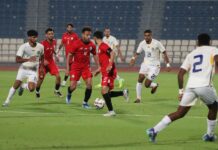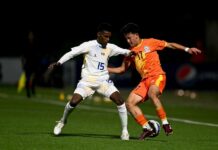The first Asian Cup held in Australia has already exceeded expectations and now the stars have aligned to produce what promises to be a classic final.
Both sides will feel confident of emerging victorious in Saturday’s clash between the host nation and South Korea at Sydney’s Olympic Stadium when the best attack in the tournament comes up against the best defence.
The delicious contrast in styles is the perfect ending to a tournament that has been full of unexpected twists and turns from the world’s most populated and diverse region.
For the Australians, the final represents a chance to finally win a major international soccer title, an anomaly for a sports-mad country that has succeeded in almost every other sport in the world.
“It is a massive game. We made the final four years ago which was great for our nation,” the Australian coach Ange Postecoglou said.
“We have been in Asia for a while now and we haven’t won anything in the men’s game, but this gives us an opportunity at a national level to achieve something.”
Victory for South Korea would give the Taegeuk Warriors their first Asian Cup title since 1960 and the country something to celebrate after a grim year on and off the sporting field.
“The players are desperate to win this tournament,” defender Park Joo-ho said. “A lot of people at home really want us to win this tournament after 55 years.”
Despite reaching the semi-finals of the World Cup in 2002, South Korea have struggled to reproduce that sort of form since.
They were eliminated in the group stage at two of the last three World Cups and before this year, had not made an Asian Cup final since 1988.
BEST IN ASIA
However, with the recently recruited Uli Stielike now in charge of an ambitious team, things are starting to look up.
The former German international is looking at a longer-term goal of restoring South Korea as Asia’s best team and has started by plugging up holes in the defence.
In their five matches at the Asian Cup, South Korea have yet to concede a goal, with first-choice keeper Kim Jin-hyeon keeping four clean sheets.
They won each of their three group games, against Oman, Kuwait and Australia by a solitary goal but found their range in the knockout matches, beating Iraq 2-0 in the semi-finals after star forward Son Heung-min netted twice in the 2-0 quarter-final win over Uzbekistan.
Stielike, in an attempt to reduce the pressure on his young squad, said Australia were favourites, playing down the significance of their pool match win because both teams had already qualified and the Socceroos rested several key players.
“We will have to work to be the same Korea. This is our target,” he said.
“For the rest, we have to take whatever is coming and try our best. We are realistic enough to understand that in the first game we didn’t play the best Australia team.”
Australia’s goals are more immediate. For all the progress they have made since ditching Oceania and joining Asia in 2006, the trophy cabinet remains bare.
They’re also trying to win over an Australian public that mostly prefers other football codes, so have adopted an all-out attacking style.
With Tim Cahill leading from up front, the Socceroos have piled on 12 goals in the tournament, four each in the group matches against Kuwait and Oman then two more in the quarter-final against China and semi-final with United Arab Emirates.
“It’s going to be special moment for all of us,” Cahill said. “But the mindset is to win, and to win the right way and by playing football and what we believe in. It’s going to be a big night.”












